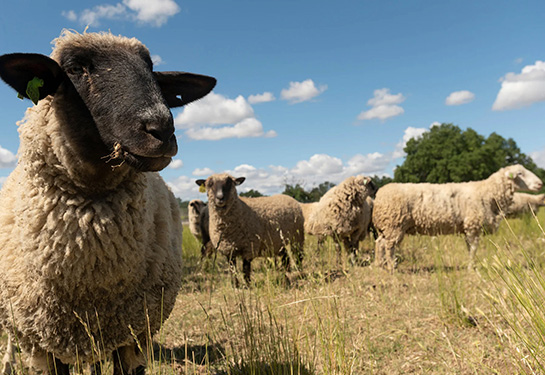Surprising benefits of using sheep as lawn mowers
Sheep can benefit urban lawn landscapes and improve mood and stress response, according to new study
Bicycles whirr by, students rush to class, staff and faculty are grabbing lunch or coffee on the go — and sheep graze the grassy knolls among the traffic, bleating every now and then. The grazing is their job.
The 25 wooly sheep who seasonally — for the past two years — leave their UC Davis barns to nibble on lawns at various central campus locations, are doing much more than mowing, fertilizing and improving the ecosystem. The sheep also are improving people’s mental health.
The sheep — four breeds of Suffolk, Hampshire, Southdown and Dorset — first took on this role in 2021, when COVID-19 masking and social-distancing protocols were in full swing. The goal was to determine whether sheep could benefit urban lawn landscapes and make a case for increasing their usage. The program is growing and exploring additional benefits sheep provide.
“This started out as an experiment to test their mowing abilities, and we have now published research on how they make people feel peaceful,” said Haven Kiers, the lead author of a new study, director of the sheep mowers project and an assistant professor of landscape architecture in the College of Agricultural and Environmental Sciences. Her given name of “Haven” seemed to be a sign that she would one day study how pastoral environments improve quality of life for humans, animals and plant life.
“I can’t believe this is research; it’s so much fun,” Kiers regularly exclaims.
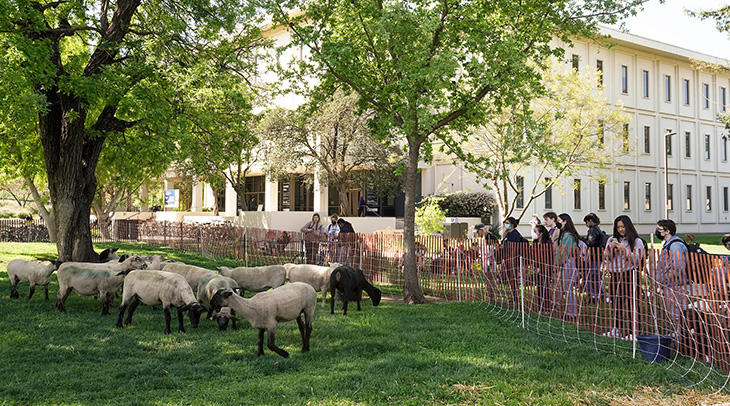
Landscape management research includes mental health and nature therapy
The research has important relevance, especially at a time when, nationwide since the 1980s, students of all ages have expressed that they struggle with stress and their mental and physical health. Kiers, co-authors and researchers surveyed about 200 students, staff, faculty, and community members about their experiences walking by, or even hanging out in Adirondack chairs studying, sketching and painting watercolors among the sheep.
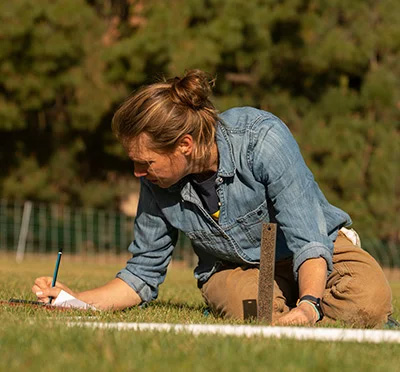
“We found that there was a significantly lower likelihood of current feelings of being ‘very stressed’ or ‘stressed’ among the sheep mower group when compared to the group that did not experience sheep mowers,” she said of the study, researched over four sheep-mowing events in spring 2022. “The group with the sheep was just so much happier,” Kiers said.
She said as far as she knows, similar stress studies have been done only with dogs and horses, not sheep. “We really need to look at how we can get the most out of landscape management, in all forms — in the physical environment as well as mental health.”
The paper, co-authored with Carolyn S. Dewa, of the UC Davis Department of Public Health, and Kelly M. Nishimura, a 2020 graduate of UC Davis and urban designer in the Office of Campus Planning and Development, was published in January in The International Journal of Environmental Research and Public Health.
Therapeutic grazing events provide stress relief
Students and other passersby participating in the experiment were interviewed by student employees and student shepherds in quick chats near the sheep and on social media. All the while, the sheep are given access to plenty of clean water, are fenced in with a combination of electrical and snow fencing, and are trailered back and forth to their home barns in the morning and at night.

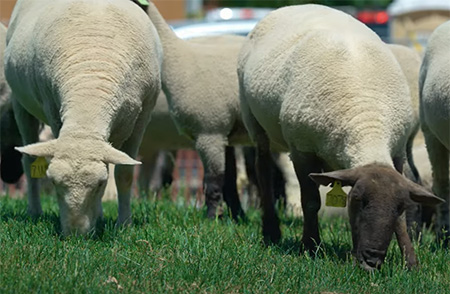
Researchers collected comments from observers, then aggregated the comments into themes that included community engagement, place identity, relaxation and academic stress reduction.
Wrote one student on the Instagram feed used in the survey: “I loved seeing the sheep right before my chem midterm; it helped me distract myself and not stress right before taking the exam.”
Mina Bedogne, a research assistant on the project and now in her fourth year of undergraduate work, said the distraction seems to make most people happy.
“Just taking a break from a chaotic workday and mindlessly observing the flock has brought joy to so many people,” said Bedogne, an environmental science and management major. “Some students find our grazing events so therapeutic that they’ll stay there for hours eating lunch, doing work and catching up with friends.”
She said the sheep events help her, too. “I also enjoy being able to forget all my other responsibilities for a few hours and engage with all the passersby in the welcoming and inclusive environment we've created.”
That is much of the vision behind the program, said Dewa, who is also chair of the Graduate Group in Public Health Sciences and professor, Department of Psychiatry and Behavioral Sciences. Dewa first met Kiers when they were examining the impacts on well-being of Kiers’ Nature Rx course, and they began a partnership that would evolve into this latest research. (Nature Rx is a program at UC Davis and other universities that seeks ways to improve mental and physical health by looking to the external environment.)
Dewa also leads the Aggie Mental Health Ambassadors program — funded by University of California’s Mental Health Equity funds to educate the UC Davis community about mental health and mental health services and support. The program builds community and encourages mental health promotion. The ambassadors offer their help on site at sheep mower events, directing art and craft projects. There, students can draw, paint and in the future, card wool — all activities that get people engaged and reduce the social isolation that can sometimes happen on college campuses, Dewa said.
“Loneliness is a struggle for many of our students,” said Dewa. “One robust research finding is that social support is a protective factor for mental health. One of the ways the sheep mower events help to promote mental health is by providing an opportunity for a shared experience. The events help people to see that they are a part of a larger group and give people a sense of community.”
One of the ways the sheep mower events help to promote mental health is by providing an opportunity for a shared experience. The events help people to see that they are a part of a larger group and give people a sense of community.”—Carolyn S. Dewa
Meet the sheep online, plus a sheep cam
The sheep mowers program reaches out beyond the grazing site too. The sheep have an Instagram account and live “sheep cam” that provides a way for viewers to look at sheep on social media when they cannot visit them in person. Additionally, a witty, creative website not only includes information on the research but introduces the sheep (and researchers) with clever individual bios, photos, sheep-inspired artwork and plenty of baaaahd puns.
It even profiles a lone “bachelor” sheep among the ewes. The backstory on that, one researcher explained, is that he is a black twin sheep who would have been used for meat (the sheep mowers are used for wool). One day, he cleverly escaped the truck that was taking sheep to auction and blended in with the pasturing wool ewes when he was mistaken for his twin sister. He got to stay. His name is Woolter.
Pastoral campuses: More schools adopt sheep mowing
Kiers is a longtime proponent of green infrastructure such as roofs where you can grow plants and urban landscapes that are aesthetically pleasing as well as ecologically productive. The practice of grazing sheep is a natural outgrowth of that research, she explained, helping to keep the grass well-maintained and fertilized. Grazing sheep emulates a historical practice throughout France, and even at the White House and in Central Park. Sheep recently started grazing the archaeological site at Pompei.
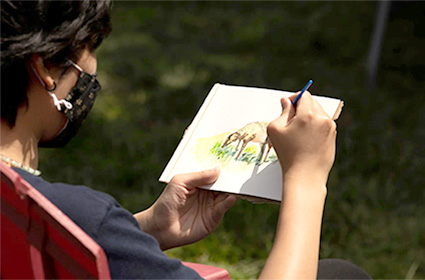
The program at UC Davis has now sparked others to adopt the idea.
Davis High School had its own sheep event, with Kiers’ help, in December 2022, to give students a mental health break as finals began. High school counselors requested the help and invited sheep from a local farm.
Heather K. Barr, a doctoral student in public health sciences who conducts research with Dewa, works with the Aggie Mental Health Ambassadors as well as therapy dogs, which are used on the Sacramento health campus. She helped at the UC Davis High School sheep event. “It’s great to see students interacting with new people and socializing after two years of Zoom school.”
Other universities are adopting programs for their campuses, too.
Margaret Vickery, a lecturer and undergraduate program director in the History of Art and Architecture at the University of Massachusetts, Amherst, and author of the recent book — Landscape and Infrastructure: Reimagining the Pastoral Paradigm for the Twenty-First Century (Bloomsbury, 2021) — read about the UC Davis program shortly after it began. Hoping to create pastoral scenes on her campus similar to those found in art history, she consulted with Kiers and teamed up with colleague Kelly Klingler, a lecturer in wildlife conservation, who took on the ecological and wildlife habitat management perspective on the project. Also a land-grant university, the Amherst school is taking an interdisciplinary approach to the project, aptly named “Sustainable EweMass.”
EweMass is involving other disciplines including literature, art, public history, ecology and of course, animal science, and is holding events with community fiber artists and even included an event featuring old, rare books held by the Arthur F. Kinney Center for Interdisciplinary Renaissance Studies that feature animal husbandry and sheep. Their sheep come from Hadley Farm, UMass Amherst’s education farm for equines and livestock.
“You see it in art over and over again,” said Vickery. “The pastoral landscape is both beautiful and productive, sheep provide clothing, insulation, fertilizer and sometimes meat, all while mowing our green swards.”
Williams College classics faculty then contacted EweMass when they heard of the program — and so the Kiers’ sheep-on-campus dream continues to flourish. Williams College is in the very early stages of planning an event in April.
“As a very first small step, we hope to bring some sheep to campus to celebrate the Parilia this April,” said Amanda Wilcox, professor and chair of the classics department at Williams. The Parilia, she explained, is an ancient Roman holiday observed on April 21. The holiday marks, among other things, the time for leading out the flocks to their summer pasturage, she said.
Sustainability and grazing ecology of sheep mowers
More studies on the UC Davis campus are expected. Kiers is still analyzing data on soil, mowing effects (did the sheep do a better job mowing that lawn mowers or not?) and beneficial insects attracted to the sites. Waste wool, or the short strands of wool from the animal’s belly and underside, is being studied to see if it can be valuable in the garden, and Kiers is in talks with faculty in the UC Davis Department of Design to use the wool in student projects.
Lucy Yuan, who wrote her senior thesis on the project last year and now works in the campus planning department, said she hopes to see sheep mowers move beyond a tourist attraction or novelty to a mainstream tool. She said she listed in her thesis about 50 potential uses.
She noted sheep could be useful for mowing hilly areas, and remote reserves that are difficult for humans and machinery to access.
“Sheep can be used to mow sports fields; they can be used on golfing greens while you play — they can be part of the appeal. There are so many ways they can be used.”

